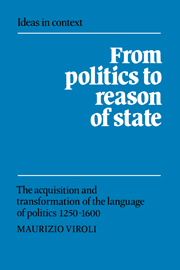 From Politics to Reason of State
From Politics to Reason of State Book contents
- Frontmatter
- Contents
- Acknowledgements
- Dedication
- Introduction
- 1 The acquisition of the language of politics
- 2 The philosophy of the city and the political man
- 3 Machiavelli and the republican concept of politics
- 4 Francesco Guicciardini: between politics and art of the state
- 5 The last glimmerings of civil philosophy
- 6 The triumph of reason of state
- Epilogue. Politics as civil philosophy
- Bibliography
- Index
- IDEAS IN CONTEXT
Epilogue. Politics as civil philosophy
Published online by Cambridge University Press: 02 February 2010
- Frontmatter
- Contents
- Acknowledgements
- Dedication
- Introduction
- 1 The acquisition of the language of politics
- 2 The philosophy of the city and the political man
- 3 Machiavelli and the republican concept of politics
- 4 Francesco Guicciardini: between politics and art of the state
- 5 The last glimmerings of civil philosophy
- 6 The triumph of reason of state
- Epilogue. Politics as civil philosophy
- Bibliography
- Index
- IDEAS IN CONTEXT
Summary
Stories often have morals. They may suggest what we are and what we could be. When they do, they help us not only to understand our past but also to construct our future. Morals are beliefs. No story has a single moral, just as no description or explanation of reality compels but one evaluation of it. The same story may well have different morals. The story I have told about politics conceived of as art of the city may strike some as a pathetic misunderstanding of politics, others as an ideological veil for domination and discrimination, and still others as the best idea of politics that modernity has ever forged. To draw a moral from my story of the transition from civil philosophy to reason of state would thus be misconceived. I shall, however, suggest how that story may help us to construct a language of politics that serves our beliefs and commitments better than that in which we now describe it. As I shall argue, current languages of politics leave out important dimensions of actual and possible political action. They do not help us to understand political life, nor do they permit us to prefigure possible political practices worth committing ourselves to.
The flourishing of scholarly investigations of politics and political action in recent years has brought with it no agreement about their meaning. No generally accepted view of politics exists. Nonetheless, contemporary theories of politics may be fairly divided, for the purpose of my argument, into two families, the realist and the critical.
- Type
- Chapter
- Information
- From Politics to Reason of StateThe Acquisition and Transformation of the Language of Politics 1250–1600, pp. 281 - 295Publisher: Cambridge University PressPrint publication year: 1992


